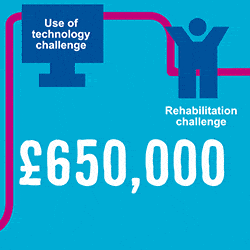Apps win innovation prizes
- 26 February 2015

An SMS helpline to support teenagers who self-harm was among the healthcare innovations to win a share of £650,000 of NHS Innovation Challenge Prizes.
The ChatHealth project set up by Leicestershire Partnership NHS Trust, and co-designed with young people, won both the digital patient and clinician engagement challenge and the use of technology challenge, receiving £100,000 from NHS England and Pfizer.
The system allows 11-19 year olds the opportunity to anonymously text message a number if they feel at risk of self-harming or are anxious about mental health, bullying, drugs or another social issue.
Messages are monitored by a small team of trained school nurses, who can follow up with further support. If somebody texts out-of-hours, an automatic text provides links to other sources of help.
During a pilot in 2013-14, ChatHealth received around 300 messages and students praised the service for being less embarrassing than traditional alternatives, quick and easy to use, anonymous and non-judgemental.
Maggie Clarke, senior nurse professional lead for school nursing at the Leicestershire trust said: “This service is a response to young people’s expectations about how we should communicate.
“School nurses need to be accessible on that platform if we are going to keep NHS services convenient and accessible for young people.”
NHS England added that one nurse can now handle all of the current in-hours texts from across the county. More than 50 NHS trusts have expressed an interest in implanting a similar system and there are also plans to develop a dedicated ChatHealth instant messaging app.
The challenge prizes were set up to support NHS England's efforts to promote innovation in the NHS and to encourage trusts to take up good ideas. This year's prizes had a total of £650,000 in prize money, plus a package of support from companies and media sponsors.
The biggest prizes – of £100,000 – were for innovations that address big health challenges, such as diabetes, or preventing premature death, while smaller 'acorn' prizes – of £10,000 – recognised "small ideas that have the potential to make a big difference to patients."
Another app winner in the main section was the MicroGuide App, which serves a library of microbiological information for doctors who want information on antibiotics and infections.
The iPhone app was developed by Horizon Strategic Partners and was first introduced in Southampton University Hospital NHS Foundation Trust.
NHS England says it has supported a reduction in prescribing of high-risk broad-spectrum antibiotics from 40% to 28% of prescribing and contributed to C. difficile infections falling from 60 cases per month to fewer than ten cases per month.
Southampton will receive £50,000 for the app’s victory in the infection control challenge prize.
Meanwhile, IT winners of the acorn awards included RELAX Anaesthetics, which helps relax children ahead of surgery by distracting them with art, music and games during the anaesthetising process.
The Android tablet app is a joint development between Imagineear, Chelsea and Westminster Hospital NHS Foundation Trust, and the hospital’s charity CW+.
A spokesperson from Imagineear said: “We have had considerable interest from other hospitals, and with the award we expect even more.”
Another acorn winner was the London Neonatal Transfer Service for its NeoMate App, which provides decision-making support to junior doctors and junior nurses.
It runs through the top ten decisions that need to be taken and helps with complex drug calculations and combinations. The app will be free to download on all major smartphones and there are plans for a national roll-out.
Outside the app space, Greater Huddersfield Clinical Commissioning Group won an Acorn prize for its Red Button web-based reporting system, which allows GPs to log quality issues and concerns, including feedback from patients.
This is collected by the CCG which uses it alongside other safety measures to monitor overall service quality.
The NHS Innovation Challenge Prizes awards event took place on 23 February. It recognised a total of 13 projects out of a total of 340 applicants.
The awards were presented by Sir Bruce Keogh, medical director for NHS England, who said: “Recognition and reward of local innovations not only promotes further innovation it is an important step in ensuring improvement across our NHS.”




